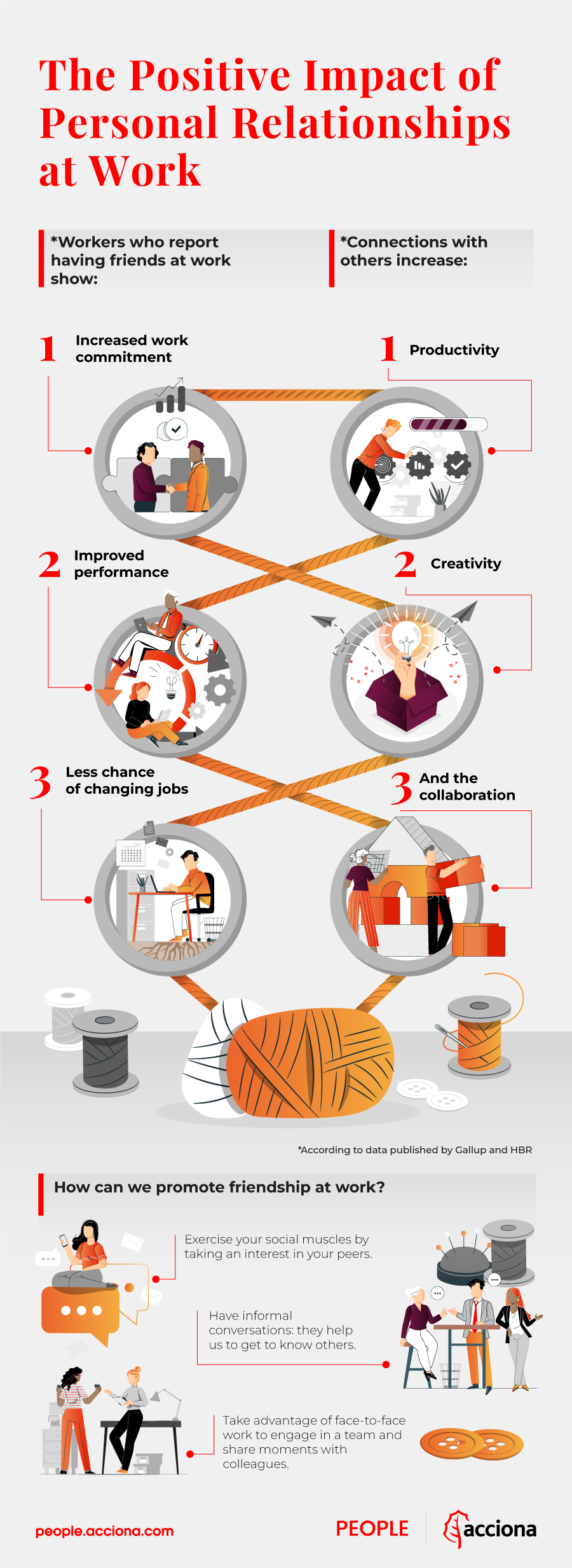Life presents itself as a vast tapestry where each strand is interwoven in such a way that it’s difficult to differentiate where one thread ends and another begins. Thus, the personal and the professional are inevitably intertwined. Trying to separate the two facets is like trying to divide the ocean with a comb, a task as futile as it is fruitless. Instead of building imaginary walls between our “work self” and “personal self”, it’d be more advisable to seek harmony between them. At least on some points. Is there room for friendship at work, for example, in the departments? Every emotion, every experience, every personal relationship filters into the work we do and shapes it.
What will I read about in this article?
- Having friends improves people’s well-being
- Benefits of friendship at work
- The power of small talk
- The office as a socialising space
Having friends (at work and outside) is good for our health
Connecting with other people makes us happy. Not only that, but it also benefits our health. So says Dr. Robert Waldinger, professor of psychiatry at Harvard Medical School and director of the Harvard Adult Development Study.
Waldinger explores this topic in his book, The Good Life, which he wrote with his colleague Marc Schulz. In it, the authors share the findings of research that studies and analyses people from adolescence throughout their lives, assessing the factors that lead to well-being.
According to experts, it is not money, professional success or trips to tropical paradises that determine whether we’re more or less satisfied with our lives. Rather, it depends to a large extent on our relationships with others: friends, family or work colleagues. It is the latter that raise the most questions: Is it possible for friendship to emerge in the work environment? The results of the research show that it’s not only possible, but necessary.
Friendship at work, an intangible factor in motivating and retaining talent
We spend a large part of our lives at work – typically around 40 hours a week. Understandably, the bonds we form with our colleagues mark us in some way.
In an increasingly interconnected world, the importance of personal relationships in our professional and personal lives cannot be underestimated. Personal connections can be a powerful driver for improved performance, both at individual and team level.
Indeed, a Gallup survey found that only 30% of workers said they had such a connection at work. However, these 30% demonstrated significantly higher work engagement, superior performance and were less likely to leave their job for a more attractive offer. In addition, the Gallup survey also found that having a close friend at work had become even more important since the pandemic and the rise of hybrid and remote work.
“Personal connections can be a powerful driver for improved performance, both at individual and team level”.
Meaningful connections in the workplace drive many of the outcomes that are fundamental to high-performing teams. As this HBR article points out, they achieve better rates of productivity, creativity and collaboration. Not only do they work better, but they provide more stability to a team.
Conversely, when employees feel disconnected from their team or lonely, their ability to concentrate deteriorates and their willingness to collaborate plummets. Worse, they devote valuable cognitive resources to trying to hide their loneliness from others, leaving less brainpower to complete projects. In short, they become less able to do their work.
Fostering friendships at work through small talk
These seemingly insignificant conversations can bring great and ongoing benefits to our well-being. In fact, research shows that small talk, even with strangers, brings a touch of happiness.

Talking about the weather, the evening’s game, plans for the weekend? These are topics of conversation that help us to build bridges to each other and to identify what interests we have in common.
“By fostering an environment that encourages employees to get to know each other on a personal level, leaders can cultivate a happier, more engaged and productive workforce,” says Waldinger in this interview. And those conversations can also pave the way for deeper conversations and friendships.
Exercise your social muscles
Waldinger suggests that just as keeping our bodies fit requires regular exercise, so do our social relationships. We need to make it a habit to enjoy its benefits.
We can start with small, simple steps. For example, as the expert points out, you could choose to send them a text message, an email or even make a phone call to simply say “Hi! I was remembering that presentation you told me about yesterday and wanted to ask you how it went”.
The author argues that small gestures are key to strengthening relationships. The same goes for curiosity. Does something on a colleague’s desk catch your eye? Take advantage of it and ask them about it. People are often flattered when they see that their tastes arouse the interest of others.

What if you make your flexible work routine more flexible?
The new reality of work, which gives prominence to flexible working models, has encouraged the emergence of new office concepts – such as hot desking – characterised by encouraging socialisation at work.
No wonder. It’s a good thing that companies offer that extra value in the office that employees don’t find when they work from home. And socialising with other people is certainly one of those things.
If you regularly work remotely, Waldinger recommends coming into the office from time to time to interact with colleagues in person. These spaces can encourage teams to collaborate, learn from each other and forge friendships.
In an increasingly digital and remote work environment, it’s vital that companies foster a sense of community and connection among their employees. Personal relationships and friendships in the workplace have a significant impact on our health, wellbeing and job performance. Not only do they make us happier, but they can also improve our performance and commitment to the company.
Sources:
- https://hbswk.hbs.edu/item/the-power-of-personal-connections-how-shared-experiences-boost-performance
- https://www.forbes.com/sites/lizkislik/2023/02/03/do-you-want-better-performance-help-people-strengthen-their-relationships/?sh=d083d0431089
- https://www.npr.org/sections/health-shots/2023/02/24/1158881773/friendships-at-work-can-boost-happiness-heres-how-to-nurture-them
- https://people.acciona.com/es/tendencias-e-inspiracion/soft-skills-nueva-llave-para-el-exito-profesional/


